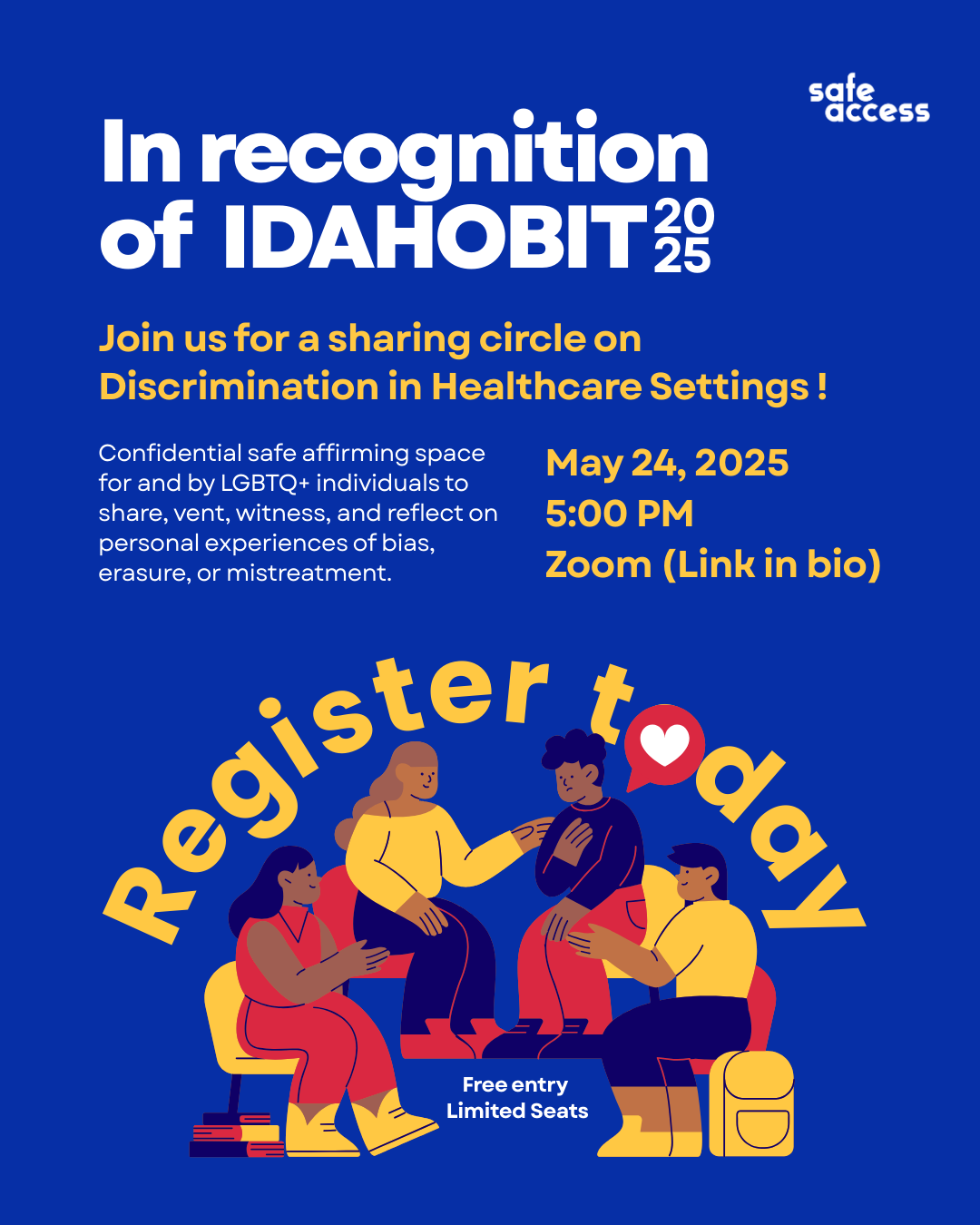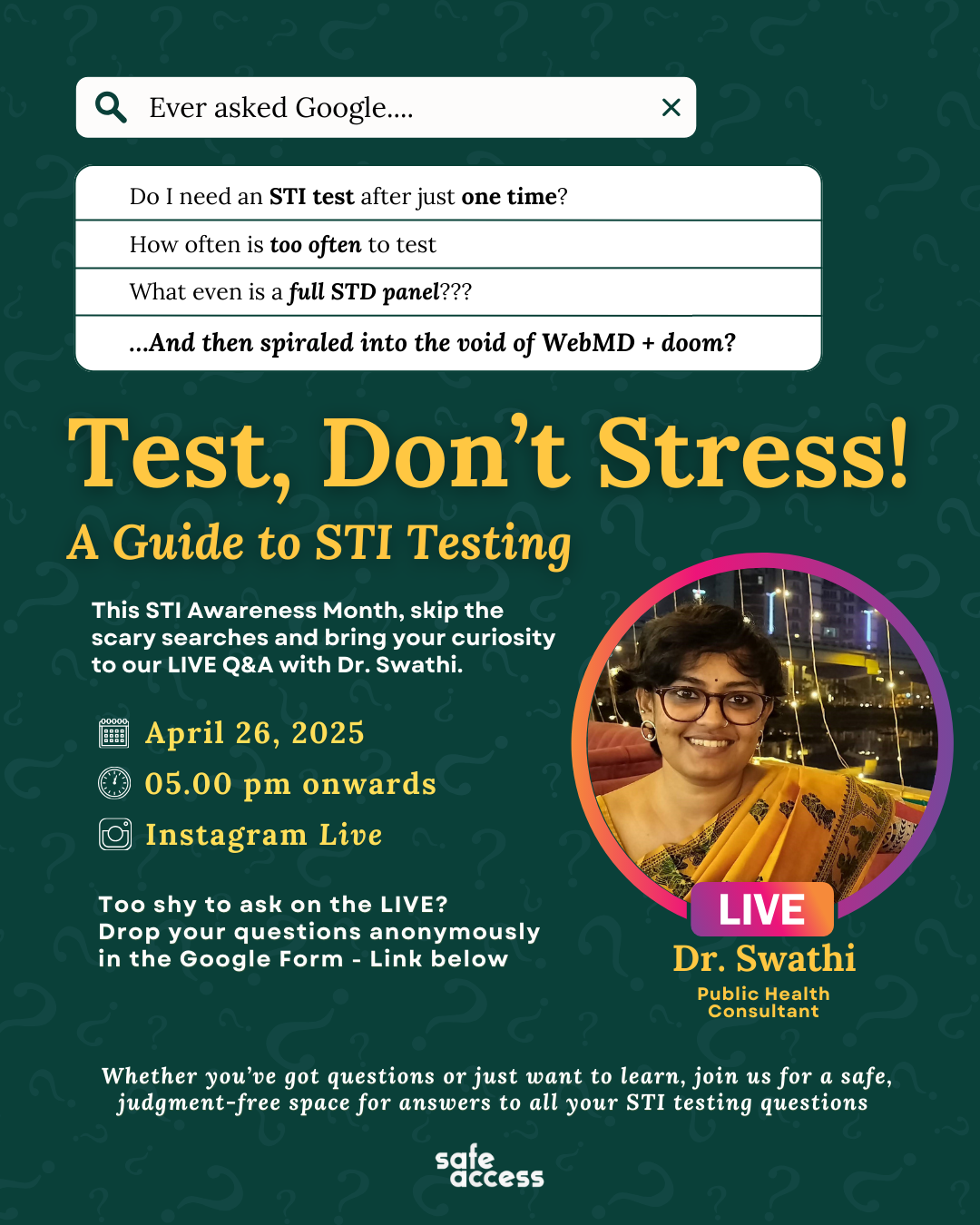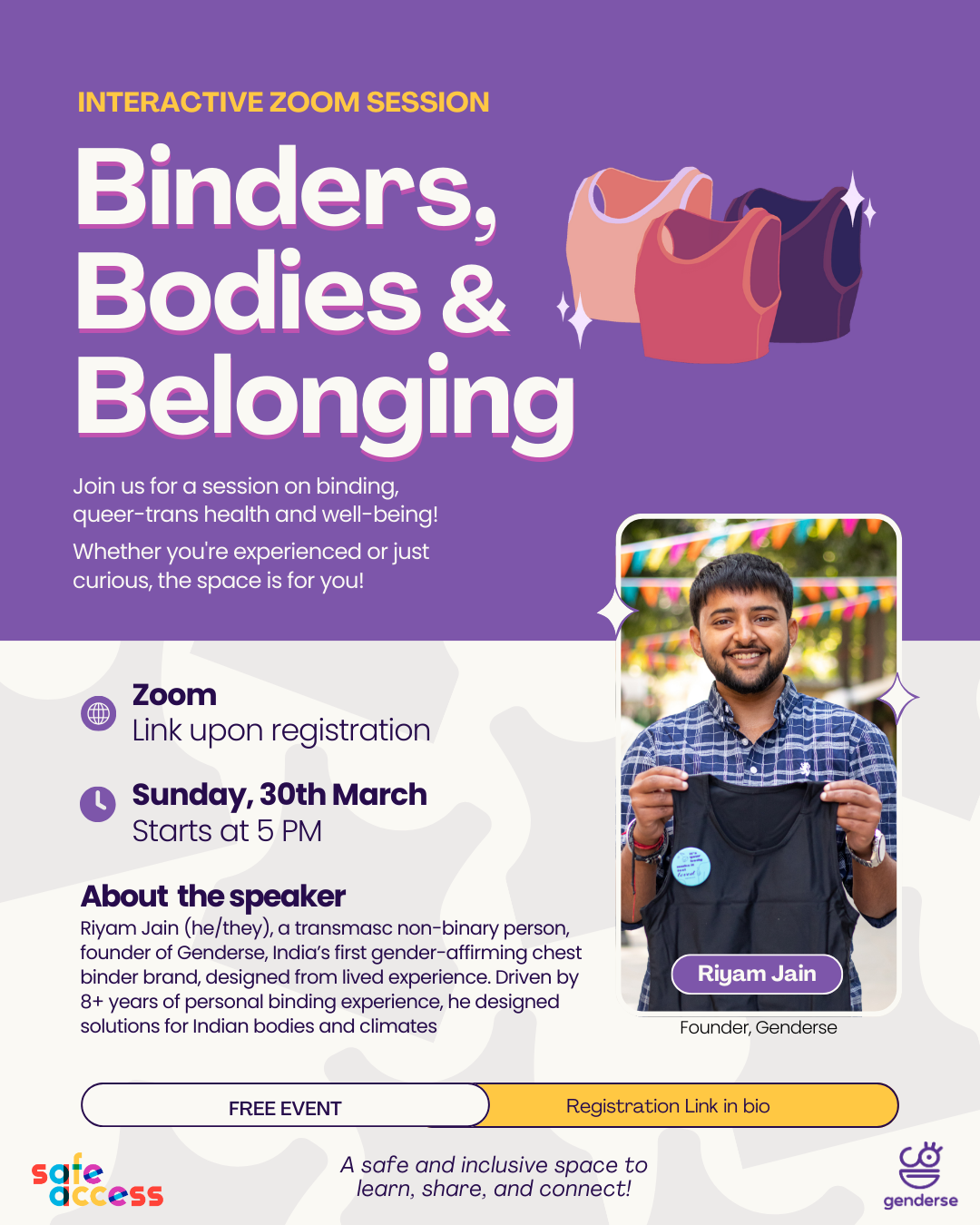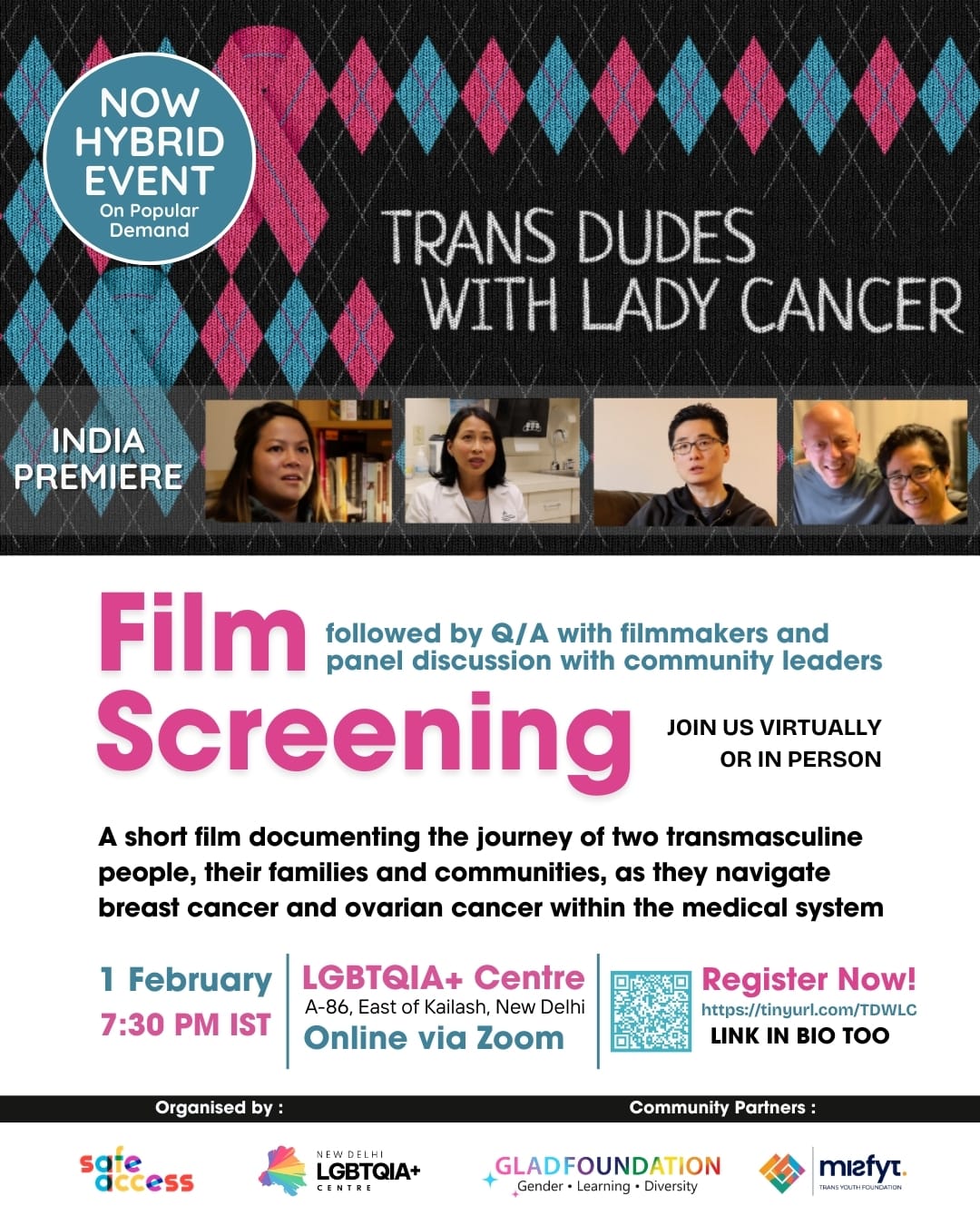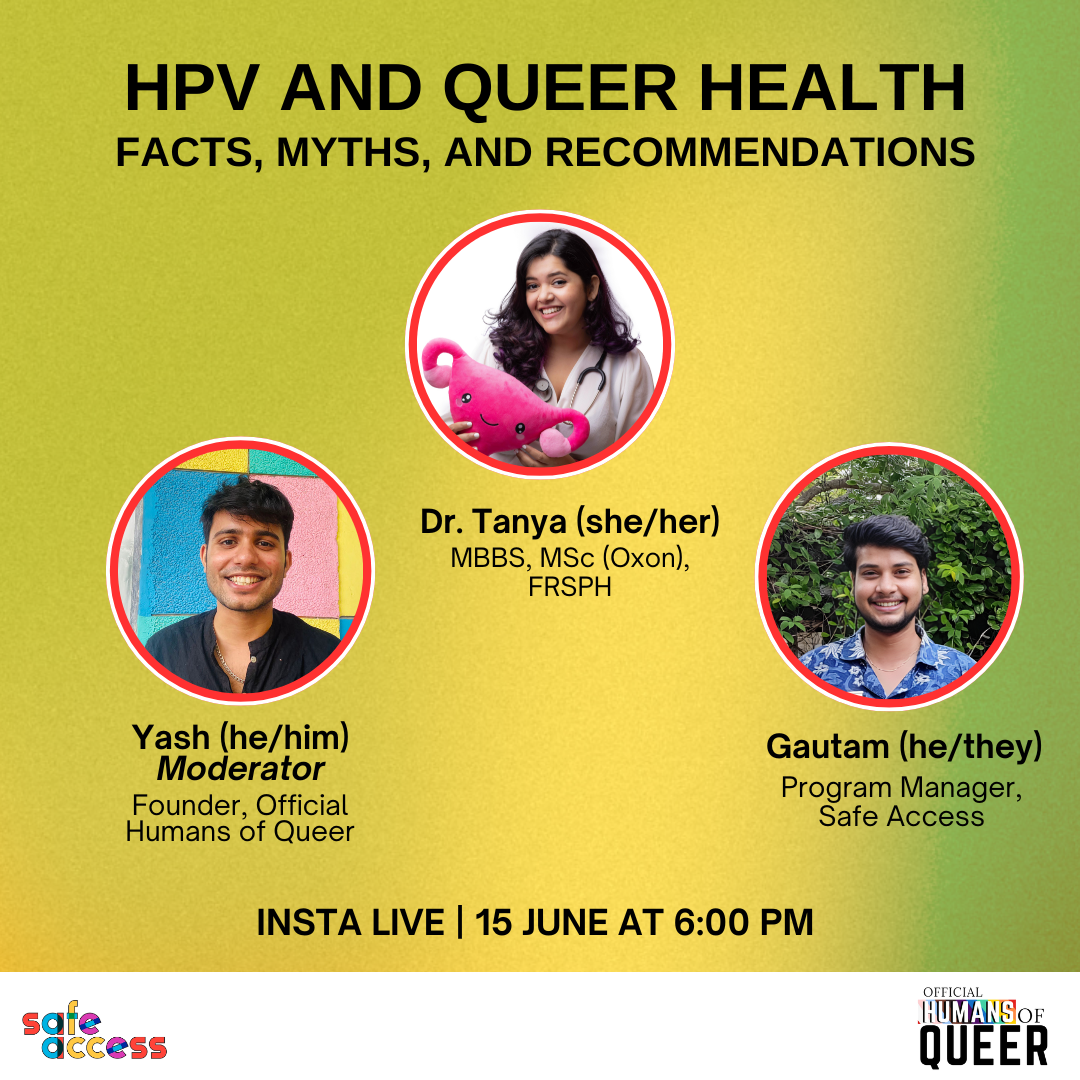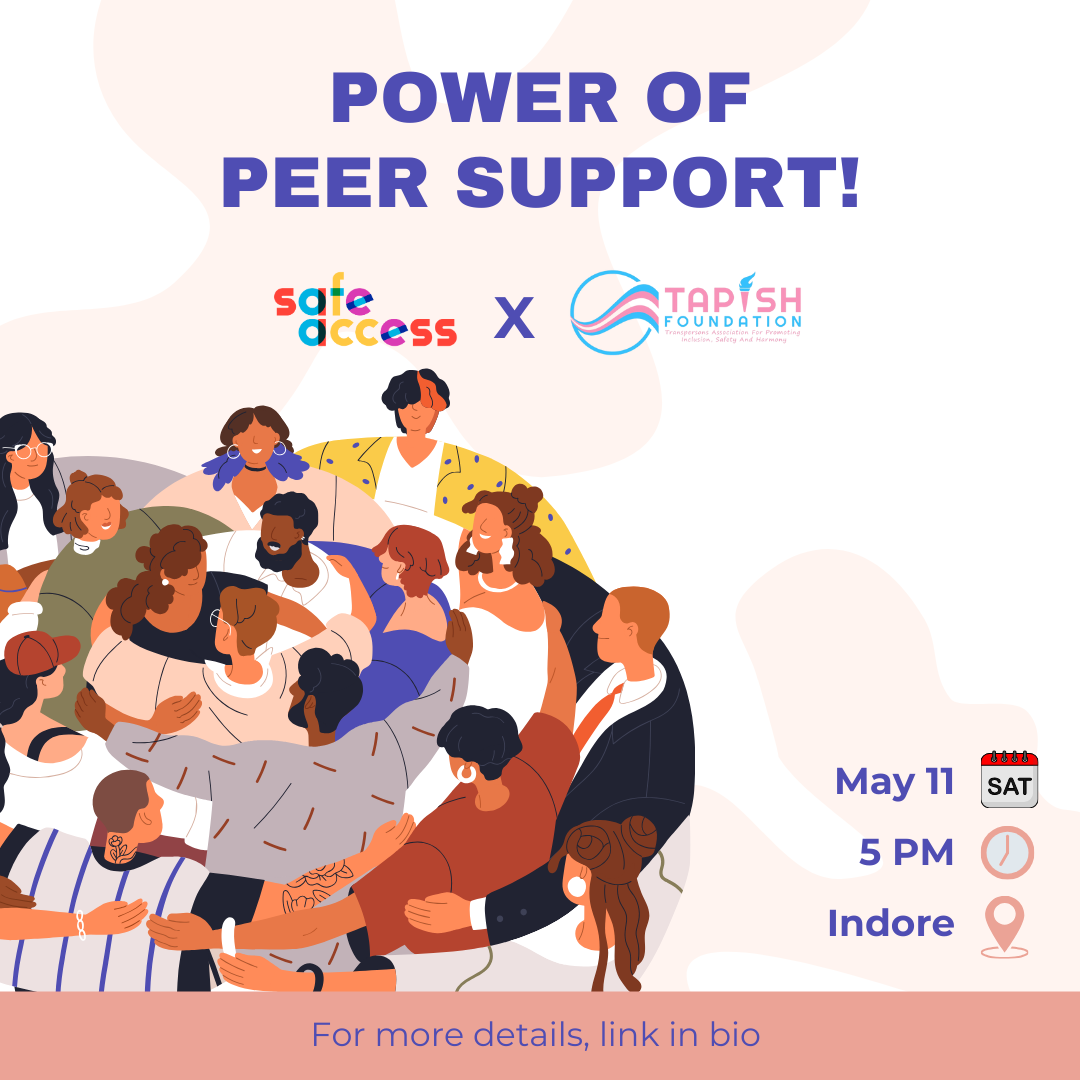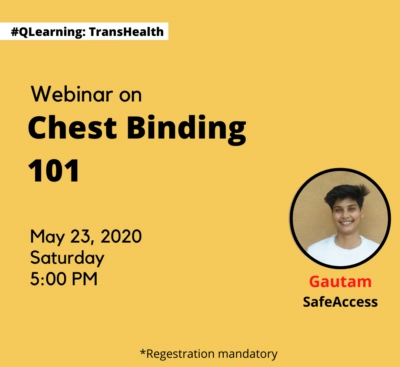Events
Date: May 24th
Day: Saturday
Time: 5:00 PM onwards
Where: Zoom (Link shared upon registration)
Free event | Limited Seats
Click here to register and reserve your spot
May 17 marks the day the World Health Organization, in 1990, declassified homosexuality as a mental disorder, a moment that gave rise to IDAHOBIT: the International Day Against Homophobia, Biphobia, Interphobia, and Transphobia.
Yet 34 years later, persistent shadows of prejudice, bias and systemic barriers continue to impact healthcare experiences for many.
In recognition of IDAHOBIT (May 17) and 2025’s ‘Power of Communities” theme, to honor how far we’ve come but also confront how far we still have to go, we are hosting our first ever sharing circle!
Join us for a sharing circle on Discrimination in Healthcare Settings – a confidential safe affirming space by and for LGBTQ+ individuals to share, vent, witness, and reflect on personal experiences of bias, erasure, or mistreatment.
We aim to foster a sense of community, validate experiences, and collectively envision a more just and inclusive healthcare system for all.
Who Should Attend:
This sharing circle is open to anyone 18+ from the LGBTQ+ community who has experienced or witnessed discrimination in the healthcare setting.
Don’t miss this chance ! Register today !
Do join our community on Instagram @SafeAccess and updates on more such events !
Read MoreDate: May 16th
Day: Friday
Time: 7:00 PM onwards
Where: Zoom (Link shared upon registration)
Click here to register for the event
As we gear up to celebrate pride and progress, we must also pause to remember those who walked before us! Pride exists because their journeys have laid the very foundations on which we now build our movements, communities, and joy.
Join us for a special evening on “Growing up Queer and Trans : Elders Edition”, a conversation with LGBTQ+ elder on what it meant to come of age in a time when acceptance, community, safety or even the vocabulary to navigate their experiences were harder to come by.
What to expect?
- Personal stories of growing up queer or trans in India – moments of struggle, survival, and solidarity.
- Reflections on resilience, self-acceptance, and finding or creating community.
- Public and private milestones that shaped their journeys.
- Insights into how ideas around gender, sexuality, love, and acceptance have evolved.
- Lessons learned, and messages of hope, healing, and strength for the younger generation and those still finding their path.
About the panelists
A. Revathi is a transgender activist and theatre artist and the author of Our Lives Our Words: Telling Aravani Lifestories, The Truth About Me, and A Life in Trans Activism. Through her platform, she advocates for LGBTQ+ rights and amplifies transgender experiences. Formerly the Director of Sangama, a human rights organization for sexual minorities, she has been honored by the Government of Tamil Nadu’s Social Welfare and Women Empowerment Department for her outstanding work for the upliftment of transgender persons.
Maya Sharma is a veteran LBT and women’s rights activist with over 40 years of experience documenting marginalized queer lives, notably in her books Loving Women and Footprints of a Queer History. She’s been a key figure in advocating for working-class lesbian and rural women. She is the co-founder of Vikalp Women’s Group, Baroda, working to improve women’s access to health, education, and livelihoods.
Bittu K. Rajaraman is a genderqueer trans man, a STEM figure and professor of biology & psychology, advocating for queer/trans liberation through the dismantling of caste, class, ableism, and gender. They are known for their neurocognition and insect communication research, bringing an intersectional perspective to academia.
About the moderator
Shubham Choudhary is the Founder and CEO of Safe Access. As a Health Equity Fellow, they are strongly committed to health equity and social justice. Their work focuses on creating inclusive communities across education, livelihood, and gender issues. Shubham is recognized as a Gandhi Fellow, an Echoing Green Fellow, a Senior Atlantic Fellow, and a Forbes 30 Under 30 honoree. A queer feminist, they are dedicated to advancing intersectional social change.
Honoring our elders is a crucial act of preserving our own history, told through the lived experiences of those who shaped it. Come listen, learn, and witness the generation that dared to live, love, dream and resist !
Know someone who’s lived through it all and has stories to tell? Nominate them in the same registration form here
Follow us on Instagram @SafeAccess for updates on guest list!
Read MoreDate: April 26th
Day: Saturday
Time: 5:00 PM onwards
Where: Instagram LIVE
Click here to submit your questions (anonymously)
Feeling unsure about STI tests? Confused about what STI tests you need? Not sure how to bring it up at the clinic? Tired of endless Google searches and panicked doom-scrolling? Navigating STI testing especially as a Queer-Trans person can be confusing overwhelming, and lowkey intimidating !
But we’ve got you covered this #STIAwareness Month!
Join us for “Test, Don’t Stress,” a judgment-free and informative Instagram LIVE Q&A with the expert Dr. Swathi SB where we’ll break down everything you need to know about STI testing: the what, when, how, and even those “omg what if?” moments!
Got questions? Tune in on Saturday or Submit them anonymously via form : here
Meet Our Expert : Dr. Swathi SB
Dr Swathi SB, co-founder of Action for Equity is a Primary care & HIV physician and public health professional. She advocates for health as a right and works as part of collectives to strengthen health systems. She explores the intersection between health, gender, caste, and sexuality. She has worked with women in sex work, and transgender communities delivering primary care and understanding the issues related to the provision of comprehensive HIV and primary health care.
Spread the word, set a reminder, and join the conversation!
Let’s talk about testing – without the stress
Follow us on Instagram @SafeAccess for updates and tune in for Live Q/A
Read MoreDate: March 30th
Day: Sunday
Time: 5:00 – 6:00 PM
Where: Zoom (link shared upon registration)
Register here : https://tinyurl.com/BinderBodiesandBelonging
Safe Access in collaboration with Genderse is hosting an interactive session over zoom will provide a comprehensive discussion on binding, trans and queer health, and overall well-being.
This session will cover basics of binding, safe binding practices, health considerations, and emotional well-being and anything else in between featuring engaging discussions, interactive polls, and a dedicated Q&A segment.
This session aims to create a safe and informative space for individuals to learn, share, and connect. anything in between!
Join us with :
Riyam Jain (Founder, Genderse) : Founded by Riyam Jain (he/they), a transmasc non-binary person, Genderse is India’s first gender-affirming as well as chest binder brand, designed from lived experience. Genderse was born from a need – a need for safe, comfortable, and accessible binding in India.
With 8+ years of personal binding struggles and trials with international brands that didn’t fit Indian bodies or climates, Riyam set out to create something better. A safe, multipurpose, breathable, and movement-friendly binder—one that works for daily wear, swimming, workouts, and even hiking in high-altitude regions that can be worn for long hours which is personally designed and tested in different Indian weather.
Session will be moderated by Aayushi (Communications Manager at Safe Access)
We want to create a safe and informative space for individuals to learn, share, and connect.
Register now: https://tinyurl.com/BinderBodiesandBelonging
Don’t miss out on this important conversation!
Follow us on Instagram @SafeAccess for updates and tune in for session.
See you there
Read MoreDate: February 14th
Day: Friday
Time: 6:00 – 7:00 PM
Where: Instagram LIVE
Love is love—but what about the law?
This Valentine’s Day, we’re diving into the legal side of Queer Love!
Safe Access in collaboration with Nyaaya is hosting a Valentine’s special Instagram Live AMA where we will be discussing LGBTQ+ legal rights w.r.t healthcare, housing, relationship, or anything in between!
Join us with :
Afreen (Program Manager at Safe Access) : Afreen’s background encompasses participatory research, health comms, & advocacy. They work on SRHR & mental health policy, track programs, & build partnerships to improve health outcomes for the queer community. Their previous experience includes work with national & international NGOs & drafting a UN CEDAW shadow report.
Kanav (Program and Communications Manager at Nyaaya): Kanav is a gender & law expert (MA, Azim Premji University) focusing on LGBTQIA+ & abortion rights. He’s worked with NGOs, nonprofits, & businesses on everything from international development to human trafficking. Featured in The Hindu, Deccan Herald, Hindustan Times, and more.
Don’t miss out on this important conversation!
Follow us on Instagram @SafeAccess for updates and tune in for live AMA.
See you there
Read MoreJoin us in person or online !
Date: February 1, 2025
Day: Saturday
Time: 7:30 pm IST
Where: New Delhi LGBTQIA+ Center
Online: Join us on Zoom (link will be shared upon registration)
We’re thrilled to host the India premiere of Trans Dudes with Lady Cancer by filmmakers Yee Won Chong and Brooks Nelson—a free event open to the public, both online and offline!
Register now to reserve your spot: https://tinyurl.com/TDWLC
Film Synopsis
What are the chances? That two transgender masculine people living under the same roof were diagnosed with “lady cancer” in the same month? One with breast cancer and the other with ovarian cancer. Trans Dudes with Lady Cancer is a courageous and personal story about the filmmakers’ navigating their journey within a medical system that is scrambling to figure out how to provide affirming care for transgender people.
The goal of the film and program is to highlight how the medical, legal and social aspects of gender transition impact the health care provided to transgender people. It aims to raise awareness of healthcare challenges faced by transgender individuals, foster understanding among healthcare professionals about providing affirming, inclusive care, and highlight legal hurdles like navigating insurance, documentation, and family formation.
Following the screening, there will be a Q&A with the filmmakers and panel discussion with community leaders to delve deeper into these critical issues.
Yee Won Chong (Filmmaker) : Yee Won uses their lived experience as a political asylee from Malaysia and community-organizing background to uncover our commonalities and our shared struggles. As an advocate of transgender justice, Yee Won Chong gave a TEDx talk, Beyond the Gender Binary, weaving his personal story about being a transgender immigrant with practical tips on how to be a good ally. Yee Won also provides transgender inclusion training to workplaces and college campuses.
Brooks Nelson (Filmmaker) : An award-winning filmmaker and the founder and director of Boxxo Productions, Brooks strives to create artistically excellent socially relevant films that feature stories of marginalized communities. He made Switch: A Community in Transition, a documentary that explores the impact of a gender transition – not on the individual going through transition, but on the surrounding community of family, friends, co-workers, and others.
Dr. Aqsa Shaikh (Medical Practitioner and Activist) : Dr. Aqsa is an out and proud transgender woman, academician and researcher. She is one of India’s First Transgender Doctors and a vocal advocate for rights-based Gender Justice for Transgender persons in India and globally. She is a Professor of Community Medicine at Hamdard Institute of Medical Sciences and Research, Jamia Hamdard, Delhi and Patient Safety Officer of HAHC Hospital. She undertakes research and advocacy for the inclusion of Transgender and Disability communities in the healthcare sector. She is also a TEDx Speaker, a poet, and a practitioner of Theatre.
Gautam (he/they): is an experienced programs and communications professional specialising in sexual and reproductive health, rights, and justice (SRHRJ), as well as LGBTQ+ advocacy. Currently, he serves as Senior Manager in the Communications and Brand department at Tata Projects. At Safe Access, he worked to build awareness and train queer-affirmative healthcare providers, while also offering emotional and psychosocial support as a peer support provider to queer-trans* community members. Gautam has also served as Co-Chair and Board Member at TWEET Foundation, where they focused on empowering the transmasculine community through resource building, community development, and providing shelter and peer support. Additionally, they contributed as a Co-Investigator with Sangath on the iHearTransMHPrep project, curating medical resources to prepare for future healthcare emergencies.
This screening is part of Safe Access’s efforts to raise awareness in the Indian context about the critical healthcare needs of transgender individuals and foster meaningful discussions within the non-profit and healthcare sectors. This will be an opportunity for us to learn from each other’s experiences in supporting transgender individuals, build connections with other organisations working in this field, and advocate for change to improve healthcare access and support for transgender communities.
👥 Hosting Partner: LGBTQIA+ Centre
🤝 Community Partners: GLAD Foundation & Misfyt Trans Youth Foundation
Don’t miss this chance to this inspiring and educational evening and be part of a critical conversation! Register today!
Follow us on Instagram @SafeAccess for more updates and hope to see you at the screening!
Read MoreDate: June 15th
Day: Saturday
Time: 6-6.30 pm
Where: Instagram LIVE
We’re thrilled to have an incredible panel to discuss the importance of the HPV vaccine for queer and trans communities:
Yash (Moderator): Love, Sex, and Stories are the three important words for Yash, a 25-year-old queer person from Delhi. Founder of Official Humans of Queer, Yash has been named in Forbes Asia’s 30 under 30 for social impact. An advocate for safer sexual practices among queer folks, Yash is also the Vice-President at Impulse New Delhi. They bring a wealth of experience from their impactful work and engaging discussions on HIV and sexual health.
Dr. Tanya (Healthcare Provider): Known as Dr. Cuterus, Dr. Tanya is a pioneer in medical content creation in India. With a background from the University of Oxford, she has become the most followed medical professional in India. Dr. Tanya’s work focuses on sexual, reproductive, and menstrual health education, aiming to create an equitable, healthier, and happier world through science, humour, and education.
Gautam (Safe Access): Gautam (he/they) is a young community activist, organizer, and mobilizer. At Safe Access, Gautam trains and builds awareness among queer affirmative healthcare providers and serves as a peer support provider. He passionately advocates for equitable healthcare access and sexual and reproductive health rights and justice (SRHRJ) for queer-trans* communities in India.
Topics We Will Cover:
1. What is HPV? – Understanding the importance of HPV vaccination for LGBTQ+ communities
2. Accessibility of the HPV Vaccine: – Where to get vaccinated in India and associated costs.
3. Overcoming Barriers: – Challenges queer individuals face in accessing the HPV vaccine and how healthcare providers can address them.
4. Vaccine Side Effects: – Discussing any potential side effects of the HPV vaccine.
5. Vaccination Schedule: – Recommended age groups and the vaccination timeline.
6. HPV Prevention: – Additional ways to prevent HPV infection and the importance of regular screening.
How This Session Will Help:
1. Raise Awareness: Highlight the critical importance of the HPV vaccine for queer and trans communities.
2. Improve Accessibility: Provide information on how and where to get vaccinated in India.
3. Address Barriers: Offer solutions to overcome challenges in accessing the vaccine.
4. Health Education: Educate on side effects, prevention methods, and the importance of regular screening.
Don’t miss out on this important conversation! Follow us on Instagram @SafeAccess for updates and tune in for expert insights and live Q&A. Let’s work together for a healthier future!
Read MoreDate: May 11th
Day: Saturday
Time: 5 to 6 pm
Venue: TAPISH Foundation, Mahalakshmi Nagar, Indore
Register here: https://forms.gle/165qbDUbHBHb4RBR8 (Registration is mandatory)
“Power of Peer Support” workshop by Safe Access in collaboration with TAPISH Foundation. The “Power of Peer Support” is part of the Community Wellbeing Project.
This session is crafted for the queer and trans communities, providing a deep dive into the concept of peer support—a system where individuals with similar experiences provide support, grounded in empathy and shared understanding. Discover how this powerful form of support not only helps tackle the unique challenges and societal stigmas we face but also fosters a nurturing environment for emotional and mental well-being.
Join us to understand the role of peer support in enhancing community resilience. Whether you’re on the journey to find support or to become a supportive presence, this workshop will equip you with the necessary insights and tools to strengthen both your life and the wider community.
The “Power of Peer Support” is part of the Community Wellbeing Project. Community Wellbeing Project is a free and confidential Peer Support Service with an objective to strengthen community resources to respond to the emotional struggles we face as queer-trans individuals due to the stigma and discrimination from society and from our own families, friends and co-workers. This program is based on the principles and values of peer support such as lived experience as knowledge, subjectivity and involvement of self as a resource to work with distress and promote wellbeing.
“We are here for you”
Read MoreDate : June 27th
Day: Saturday
Time: 4 to 5:30 pm, Over Zoom
Safe Access and Law Schools’ Queer Alliance (LSQA) jointly organized a panel discussion on conversion therapy, that people of LGBTQIA+ are continue to be subjected to in India.
We put together a holistic panel that includes voices of the LGBTQIA+ civil society, mental health community and legal community to debate and discuss the following:
(1) The what and why of the so-called conversion therapy and how it harms those subjected to it
(2) Why is it still being practiced if it violates the rights of those subjected to it, from a legal standpoint
(3) What should be the response/next steps of the mental health community, legal community and LGBQIA+ civil society to move towards a future where we can put a stop to conversion therapy
The recording of the entire panel discussion is available below
The Panelists:
Dr. L Ramakrishnan
Dr L Ramakrishnan is a public health professional, and vice president at SAATHII, an NGO working on inclusive health care, justice and social protection for communities marginalized on account of gender, sexuality and/or HIV status.
Pooja Nair
Pooja Nair has been part of the non-profit sector for over a decade. She has worked variously as a researcher, documentation consultant, trainer and now as an independent therapist. She is faculty at Mariwala Health Initiative’s Queer Affirmative Counselling Practice certificate course. She has an MPhil in social work and has worked in the areas of life skills, gender, sexuality, violence and child sexual abuse. She has also worked with adolescents on life skills development. She’s currently working on her PhD in addition to being a mental health practitioner and trainer. Pooja is a member of LABIA- a queer feminist LBT collective.
Arjun Kapoor
Arjun is a lawyer and psychologist with the Centre for Mental Health Law and Policy, Indian Law Society, Pune. After completing his B.A. LL.B. from NALSAR, Hyderabad, he worked as research assistant to the Supreme Court of India, and subsequently with the Centre for Social Justice, Ahmedabad for developing socio-legal interventions on access to justice. Currently, he works with a range of stakeholders for law & policy reform at the intersection of human rights, mental health, and suicide prevention in India. He is also a peer-counsellor for the LGBTQIA+ community.
Read MoreDate : May 23rd
Day: Saturday
Time: 5 to 6 pm
Want to bind your chest but no idea where to start? Do you struggle with your binder? Worried about risk associated with binding?
If you are looking for answers to any of above questions then this session is for you! This session will cover basics about chest binding along with tips and tricks. We will also discuss some of the risks associated with binding and how to minimize it. This session which will be facilitated by our very own in-house expert Gautam!
Contrary to popular belief, Lorem Ipsum is not simply random text. It has roots in a piece of classical Latin literature from 45 BC, making it over 2000 years old. Richard McClintock, a Latin professor at Hampden-Sydney College in Virginia, looked up one of the more obscure Latin words, consectetur, from a Lorem Ipsum passage, and going through the cites of the word in classical literature, discovered the undoubtable source. Lorem Ipsum comes from sections 1.10.32 and 1.10.33 of “de Finibus Bonorum et Malorum” (The Extremes of Good and Evil) by Cicero, written in 45 BC. This book is a treatise on the theory of ethics, very popular during the Renaissance. The first line of Lorem Ipsum, “Lorem ipsum dolor sit amet..”, comes from a line in section 1.10.32.
The standard chunk of Lorem Ipsum used since the 1500s is reproduced below for those interested. Sections 1.10.32 and 1.10.33 from “de Finibus Bonorum et Malorum” by Cicero are also reproduced in their exact original form, accompanied by English versions from the 1914 translation by H. Rackham.
Contrary to popular belief, Lorem Ipsum is not simply random text. It has roots in a piece of classical Latin literature from 45 BC, making it over 2000 years old. Richard McClintock, a Latin professor at Hampden-Sydney College in Virginia, looked up one of the more obscure Latin words, consectetur, from a Lorem Ipsum passage, and going through the cites of the word in classical literature, discovered the undoubtable source. Lorem Ipsum comes from sections 1.10.32 and 1.10.33 of “de Finibus Bonorum et Malorum” (The Extremes of Good and Evil) by Cicero, written in 45 BC. This book is a treatise on the theory of ethics, very popular during the Renaissance. The first line of Lorem Ipsum, “Lorem ipsum dolor sit amet..”, comes from a line in section 1.10.32.
The standard chunk of Lorem Ipsum used since the 1500s is reproduced below for those interested. Sections 1.10.32 and 1.10.33 from “de Finibus Bonorum et Malorum” by Cicero are also reproduced in their exact original form, accompanied by English versions from the 1914 translation by H. Rackham.
Read More
